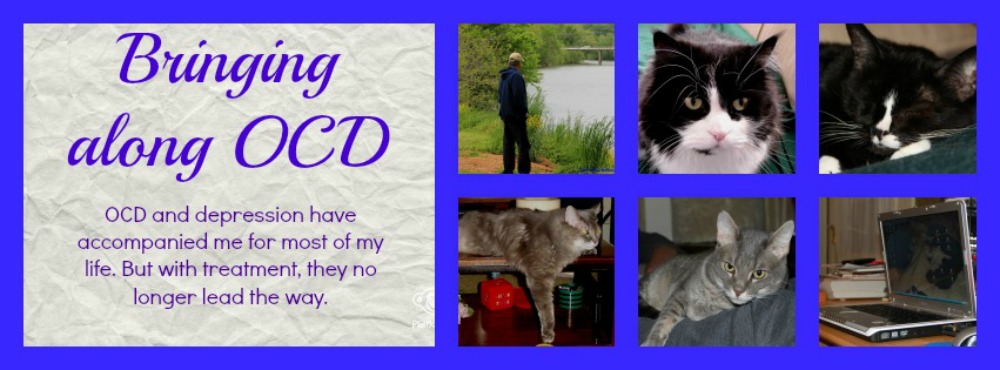Today I have the pleasure of
reviewing a book written by a woman who I met through blogging and who has
inspired me with her advocacy for educating others about OCD.
Janet writes a blog called ocdtalk, where she discusses her
experiences as a parent of a son with OCD and their journey to find help. She
also keeps readers updated on research being done on OCD. And she is an
advocate for Exposure and Response Prevention therapy, the leading therapy for
OCD.
In her book, Janet writes about
Dan’s journey from being unable to eat, from lying on the floor for days at a
time, caught in the snares of OCD, to reaching a diagnosis of “mild” OCD and being
able to have a fulfilling life.
Dr. Seth J. Gillihan is an expert
in treating patients with OCD and other anxiety disorders. In addition to
having a clinical practice, he is a clinical assistant professor of psychology
in the Psychiatry Department of the University of Pennsylvania and a visiting
assistant professor of psychology at Haverford College.
Gillihan gives readers the “facts”
about OCD: what it is, what the symptoms are, what treatments are available,
what problems people seeking treatment might face, and more.
The abiding theme of Overcoming OCD is hope. But Janet isn’t
feeling much hope when her story begins. Her son Dan has struggled during his
first year of college, and Janet visits him to try to help.
She is shocked by his haggard
appearance and his obvious anxiety. And she is shocked when they reach the
motel where she is staying, and he is unable to climb the concrete steps up to
the second floor.
Step by step, slowly, she helps
him up the steps. Then he says he’s unable to come into the motel room. She
pulls him into the room.
“And so our journey began,” she
writes (p. 2).
Janet knew her son had OCD, but
she had never seen it manifested in such debilitating ways. Dan couldn’t eat,
couldn’t use his cell phone, couldn’t drive, and couldn’t go to certain places.
His promising future in animation—a dream that he had had for years—seemed in
jeopardy.
Janet and her husband Gary and the
rest of their family rallied around Dan and supported him on his road to
recovery, which was never linear and never easy.
Dan spent about nine weeks in a
residential OCD treatment center, and Janet and her husband struggled with
staff who seemed to be leading Dan to a life of lower expectations. The
treatment center did give Dan a good foundation in ERP therapy, providing him
with tools to fight his OCD.
The family moved to Dan’s college
town so that they could be there to support him. He saw a number of doctors and
was on a number of medications. Side effects of some of those medications put
Dan into a medical crisis and delayed his recovery.
Janet learned to speak up and ask
questions of Dan’s caregivers. She did her own research. She interviewed
perspective doctors to find the right fit for Dan. She supported Dan in the
tenuous dance of being independent but getting the help he needed to fight the
OCD.
And she and Gary remained Dan’s
cheerleaders and advocates, supporting him unconditionally without enabling him
in his OCD.
I read Janet’s blog, so I know that
Dan is now doing great, with mild OCD. He graduated from college and has a job
that he once dreamed of.
But as I read her book, I felt a
taste of the anxiety that Janet and her husband felt as they watched their son
sink so low that they never thought he’d come back. I felt the anger at the
lack of caring and lack of knowledge that some so-called experts displayed in
treating Dan.
I also wanted to reach into the
book and tell Dan, It’s going to be OK. I guess that comes from my own
experiences with having OCD and having to fight my way to better health.
Janet’s story makes it clear that ERP
therapy, sometimes with, sometimes without medication and other therapy, can
help those with OCD become more than their OCD. They can live fulfilling lives
despite having OCD.
But she shows that one must search
for and sometimes fight for good mental health care. Her story makes it clear
that there’s still so much education needed of even medical professionals about
how to best diagnose and treat OCD.
Gillihan’s explanations are very
helpful, especially for those not familiar with OCD.
I really didn’t want to put this
book down after I started it. It’s inspirational, absorbing, and just a plain
good story.
Parents with children who have OCD
would particularly benefit and would be reminded that they are not alone in
their journey. The beneficial role that family support can play is well
illustrated.
I would also highly recommend this
book to anyone who wants to know more about OCD and to those with OCD. I found
myself relating to so much of what Dan experienced.
Throughout the journey that Janet
and her family took with Dan, family friend and clinical psychologist Mark was
a godsend, a person who offered information and hope to the family. In her book,
Janet writes, “If you are going to have a mental health crisis in your family,
I recommend having a close friend who is an amazing clinical psychologist” (p.
25).
I would add that having a family
like Dan’s would help those suffering through a mental health crisis see the
light at the end of the tunnel.
Overcoming OCD: A Journey to Recovery is published by Rowman &
Littlefield. 2015. For information about ordering the book, go HERE.







